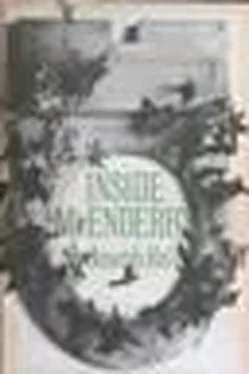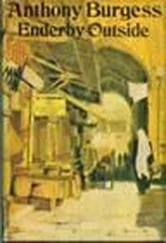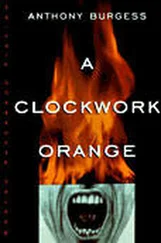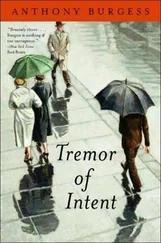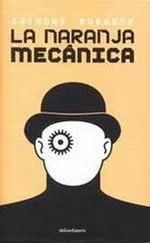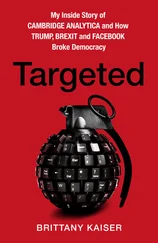I saw you the other night out on the field
Walking with a big stick with which you struck the grass
Repeatedly, but the dumb grass would not yield
To your importunities. So it will come to pass
That that piece of china standing on your shelf
Will fall on your head and give quite a shock to your evil-smelling self.
For dinner there were fish and a rice pudding with sultanas embedded in it. Mr Beecham, his hands vermilion from his day's work on a large symbolical canvas, slowly picked out all the sultanas from his portion and arranged them in a simple gestalt on his bread-plate. After dinner there was television: amateur boxing which excited two patients so much that one of the nurses had to switch over to the other channel. On the other channel was a simple morality of good and evil set in the West of North America in the eighteen-sixties. It was interrupted at intervals by asthenic women demonstrating washing-machines, though some patients evidently could not see these as interpolations, taking them rather as integral to the plot. Integration was the theme: the building of a new human society under the sheriff's steadfast bright star. Hogg nodded frequently, seeing all this (conquest of new territory, death to the evil antisocial) as an allegory of his own reorientation.
High summer in Snorthorpe. Boats for hire by the bridge, by the bridge a hotel called the White Hart, much favoured by summer visitors. Drinkers squinting happily in moonlight on the terrace. Dogs yapping in glee, chased by children. Ducks and swans, full-fed, pampered. Willows. An old castle on a height far above the river.
A knot of men came walking, in loose formation though evidently a supervised gang, in the direction of the little town from the sunbrown fields of the Agricultural Station. They were men who looked as burnt and fit as the boating visitors, each carrying some such tool as a hoe or fork. By the bridge they halted at the cheerful command of their leader. "All right," he called. "Rest for five minutes. Old Charlie here says he's got a stone in his boot." Mr Peacock was a decent brown man, squat and upright, who treated his charges like young brothers. Old Charlie sat on the parapet and Mr Peacock helped him off with his road-dusty boot.
"Fag?" said Piggy Hogg (as he was jocularly called) to his companion. Bob Curran took one, nodding his thanks. He pulled out a cheap cylindrical lighter and struck it, the flame invisible in noon air that was all flame. Piggy Hogg bent over, sucking his fag alight.
"Won't be long for you now," said Bob Curran.
"Won't be long," said Piggy Hogg, taking in the long receding bank of willows. "Next week, they reckon." He detached a tobacco fibre from his lower lip. The lips were framed in brown beard pied with grey; his skin was tanned; he wore steel spectacles. He had something of the look of Hemingway, but there his association with literature ended. A moderately well-spoken middle-aged man evidently not used to manual work, but a good trier, respected by his ward-mates, helpful as a letter-writer. Some had said that it was a waste of an educated man, putting him like they said they were going to as bar-tender in training at a Midland hotel. But Piggy Hogg knew it was no waste.
A couple of nights back he had, after lights out, slipped on his bedroom headphones. Rejecting, with a click of the plastic dial on the wall, first the Light, then the Home, he had notched into the Third. A bored-sounding young man had been talking about Modern Poetry: "… Enderby, before his unaccountable disappearance… established as a good minor poet in the tradition… perhaps little to say to our generation… the more significent work of Jarvis, Sime and Cazalet…" He had listened with absolutely no interest. One was used, one was thrown away; Enderby had come out of it better than many; Hogg was looking forward to being a bar-tender. A bar-tender, moreover, who would be different from most, quite a character with his odd lines of poetry thrown out over the frothing pints. Behind the words and rhythms lay the sensations. Time for those.
"What did the old sky-pilot have to say to you?" asked Bob Curran.
"Him?" said Piggy Hoggy vaguely. "Oh, I thought he made out quite a reasonable case for the Church of England. It's a communion of sorts. It doesn't make too many demands. He lent me some books to read, but I told him I'm not much of a reading man. If it'll give him any pleasure, I'll join."
"I've never been much of a man for religion myself," said Bob Curran. "My dad was a tinker and all tinkers are atheists. We used to have a lot of fun, I remember, on Thursday evenings in the old days. You know, belly of pork and cider and somebody would give a talk about Causal Necessity and then there'd be one hell of a discussion afterwards. All in our front parlour, you know, with The Death of Nelson above the Joanna." Bob Curran was a very lean man of fifty-seven, a radio salesman recovering from schizophrenia. "It seems to me," he said, "that people had more faith in those days. They believed more. Why, I do believe that my old man, who was nothing more than an ignorant old tinker, believed more in there not being a God than some of these religious sods today believe in there being one. It's a funny old world," he concluded, as he always did.
"Oh, yes," agreed Piggy Hogg, "but it's not without interest." After lunch there was to be a cricket match between the Home and the local St John Ambulance. Piggy Hogg had been persuaded to umpire. He had always been flustered by l.b.w. but, he had decided, when in doubt over any appeal except an obvious clean bowl or catch, always to say, "Not out". That night there was to be a singsong led by Dr Wapenshaw, with beer from the canteen-two bottles a man. Piggy Hogg led the winning quiz-team. He had beaten Alfred Breasley at chess.
"Right, my tigers," called Mr Peacock. "Old Charlie's boot's free from stones." (Old Charlie grinned without teeth.) "God's in his heaven, all's right with the etcetera etcetera. On our merry way. Let me see, it's Saturday, isn't it? Corned beef and mashed and beetroot and treacle tart to follow. Right, Piggy old man, stop slavering at the chops. Let's march."
Piggy Hogg glanced up at the tiny clouds (cotton-wool stoppers from heavenly aspirin-bottles) and down at the sun-warmed boats on the shore that looked like chicken-carcasses. A swan opened an archangelic wing. Shouldering his hoe, chucking away his fag-butt, he marched.
Anthony Burgess was born in Manchester in 1917 and studied English at the university there. He was drafted into the army upon graduation in 1940 and spent six years in the Education Corps. After demobilization, he worked first as a college lecturer in Speech and Drama and then as a grammar-school master. From 1954 to 1960 he was an education officer in the Colonial Service, stationed in Malaya and Borneo, and it was while he was there that he started writing The Malayan Trilogy, which is published by Penguin as The Long Day Wanes. In 1959 Burgess was diagnosed as having an inoperable brain tumour and was given less than a year to live. He then became a full-time writer and, proving the doctors wrong, went on to write at least one book a year and hundreds of book reviews right up until his death in 1993.
A late starter in the art of fiction, Anthony Burgess had previously spent much creative energy on music, and in his lifetime he composed many full-scale works for orchestra and other media. His Third Symphony was performed in the USA in 1975 and Blooms of Dublin, his musical version of Joyce's Ulysses, was presented in 1982. He believed that with the fusion of the musical and literary forms lay a possible future for the novel. The Enderby novels: Inside Mr Enderby, Enderby Outside, The Clockwork Testament and Enderby's Dark Lady, are also published in Penguin Twentieth-Century Classics as The Complete Enderby. His many other works include Tremor of Intent; Honey for the Bears; Urgent Copy; Nothing Like the Sun; Man of Nazareth, the basis of his successful TV script Jesus of Nazareth; Earthly Powers, which was voted the best foreign novel of 1980 in France; The End of the World News; The Kingdom of the Wicked, winner of the Prix Europa in Geneva; The Piano Players; Any Old Iron; A Mouthful of Air; Homage to QWERTYUIOP, an anthology of his reviews and journalism; and two volumes of autobiography: Little Wilson and Big God, which was awarded the J. R. Ackerley Prize for 1988, and You've Had Your Time. His last novel, published in the spring of 1993, was A Dead Man in Deptford, based around the murder of Christopher Marlowe.
Читать дальше
